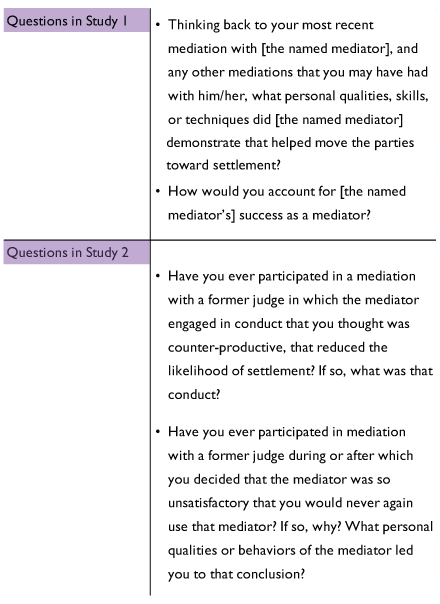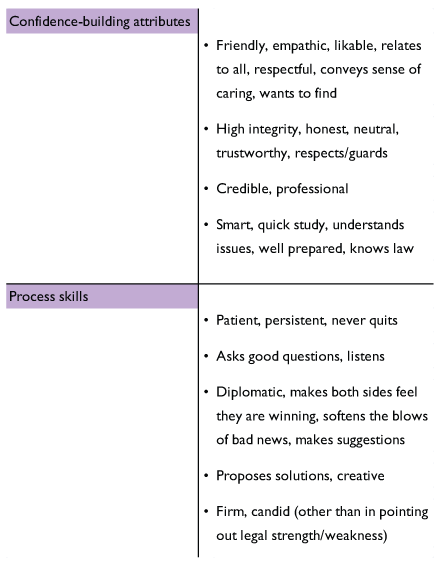Leadership Sep 2, 2010
Successful Mediators Wanted: No Robe Required
Skill should trump judicial experience when choosing a mediator?
The skills of mediators and the ways they approach their work are more important than judicial experience in helping parties reach a settlement, according to Jeanne Brett, a professor of management and organizations at the Kellogg School of Management.
Mediation—the attempt to settle a disagreement out of court with the help of a neutral third party—is frequently used to address employment and commercial disputes. Some mediators are former judges, but mediation is a very different process from adjudication, Brett explains. “A mediator can’t impose an outcome on the parties, and there is not that much deference to mediators,” she says. “In some respects, it is an odd retirement job for judges. So we wondered if the ex-judges who are mediating are doing something different from professional mediators who do not have judicial experience.”
Brett and her colleagues found key similarities between successful mediators with and without prior judicial experience: the ability to inspire confidence, patience, persistence, skill in asking good questions and listening to responses, and tact or diplomacy.
Letting Lawyers Be the Judge
To examine the attributes of successful mediators who are former judges, Brett collaborated with Stephen B. Goldberg, a professor at Northwestern University and a mediator for more than 25 years, and Margaret L. Shaw, a professional mediator with JAMS, a company specializing in mediation. They selected 28 former judges who had active mediation practices and had each mediated at least 26 disputes (24 had mediated more than 100 disputes).
The researchers asked each mediator for the names of the lawyers involved in six different mediations (two lawyers for each mediation, 12 names in total per mediator). They sent letters to the lawyers asking about their experiences with the mediation (see Table 1). The researchers received responses from 291 lawyers and coded them by 21 different skills and attributes, which they then grouped into three broad categories: confidence-building skills (the ability to gain the trust and confidence of the parties), evaluative skills (the ability to encourage agreement by evaluating a party’s likelihood of achieving its goals in court or arbitration), and process skills (skills by which a mediator seeks to encourage agreement, not including evaluative skills).
Table 1
Brett’s team found that the most important attributes of successful mediators with prior judicial experience were those that built the disputants’ confidence in the mediator. Examples of confidence-building attributes that the lawyers cited included being smart, being well-prepared, understanding the issues, and knowing the relevant law. Certain process skills were also associated with successful mediation, such as “proceeding with patience and persistence” and “asking good questions and listening carefully to the responses.” (Table 2 lists the top skills of successful mediators according to the lawyers surveyed.)
Table 2
The researchers compared the lawyers’ responses with findings from a similar study of 22 nonjudge mediators, which Goldberg and Shaw published in 2007. Confidence-building was the most important skill for mediators with and without prior judicial experience, they found. Lawyers viewed certain process skills as important to the success of both former judges and nonjudges as mediators, but generally believed process skills were significantly more important for nonjudges. The ability to provide useful case evaluations, on the other hand, was significantly more important for former judges than for nonjudges.
The researchers emphasize that judges do not have a monopoly on case evaluation skills. In fact, when they combined the profiles of the judges in the current study and the profiles of the nonjudges in the 2007 study, three of the ten mediators ranked as having outstanding case evaluation skills were nonjudges.
Brett acknowledges that a judicial background has two important advantages for a mediator: clients automatically respect former judges, and lawyers assume that they are intelligent. “The lawyers are comfortable with them, so that gets them in the door,” she says. “But what makes them successful at moving disputes toward settlement is really the same thing as the lawyer-mediators, that is, their interpersonal skills in generating confidence in them on the part of the clients and lawyers.”
“Judge-like” Behaviors Are Counterproductive
In a second study, Brett and her colleagues examined why some mediators are unable to help parties reach a settlement. They sent a second questionnaire to each lawyer who responded to the first one, asking about unsatisfactory mediation experiences (see Table 1 above). They received 117 responses.
Among the criticisms of mediators with judicial experience was that the mediator was unfriendly, self-absorbed or self-important, and/or lacked empathy. For example, one lawyer complained, “The former judge still thinks he is a judge and the behaviors that go with that are arrogance, ego, self-centeredness.”
Brett says, “What makes a judge-mediator unsuccessful is when he acts like a judge and tells people what to do, rather than nudging people into settlements.” Moving from a judicial career into mediation “requires a particular behavioral transition,” she adds.
Findings Differ from Those of the American Bar Association
Brett and her colleagues report that a 2007 study by the American Bar Association (ABA) identified four factors that are important to mediation quality: preparation for mediation by the mediator, parties, and counsel; case-by-case customization of the mediation process; analytical assistance from the mediator; and persistence by the mediator.
Notably, the ABA study contains no reference to what Brett’s group calls “the mediator’s confidence-building attributes.” These can include integrity, neutrality, fairness, friendliness, empathy, likability, and respectfulness. Given that participants in Brett and colleagues’ study felt these qualities were helpful in both former judges and nonjudge mediators in moving a dispute toward a settlement, Brett and her colleagues were surprised the ABA study did not find these attributes to be important.
Choosing a Mediator
Brett and her colleagues conclude that lawyers choosing a mediator should first look for someone who possesses one or more of the important confidence-building attributes, such as being friendly, smart, or well prepared. In addition, lawyers should weigh the importance of process skills and/or evaluative skills in overcoming barriers to settlement in the case under consideration.
It is incorrect to assume that all former judges possess strong case evaluation skills and weak process skills, or that all nonjudges possess strong process skills and weak case evaluation skills, Brett emphasizes. Furthermore, even a mediator with strong evaluation skills or strong process skills may not succeed in moving a dispute toward settlement if he or she lacks interpersonal skills.
“The absence of important interpersonal process skills—tact/diplomacy, understanding people/relational dynamics, being friendly/empathic—appears, from the respondents’ comments, to be more common among judges than nonjudges, and that absence may serve to offset the advantage of prior judicial experience in gaining the confidence of the parties,” Brett and her colleagues conclude.
Goldberg, Stephen B., Margaret L. Shaw and Jeanne M. Brett. 2009. What Difference Does a Robe Make? Comparing Mediators with and without Prior Judicial Experience. Negotiation Journal, 25(3): 277-305


